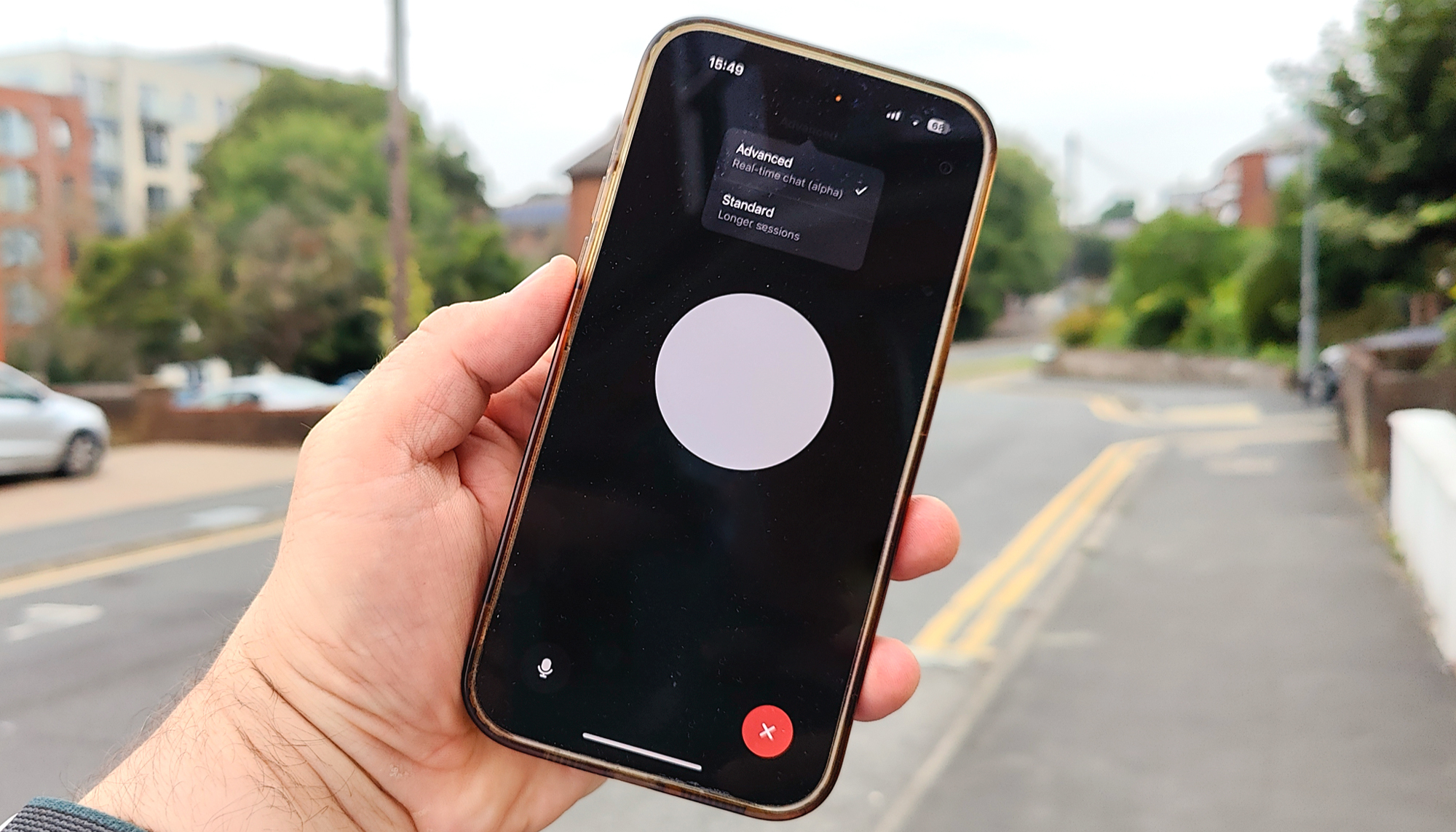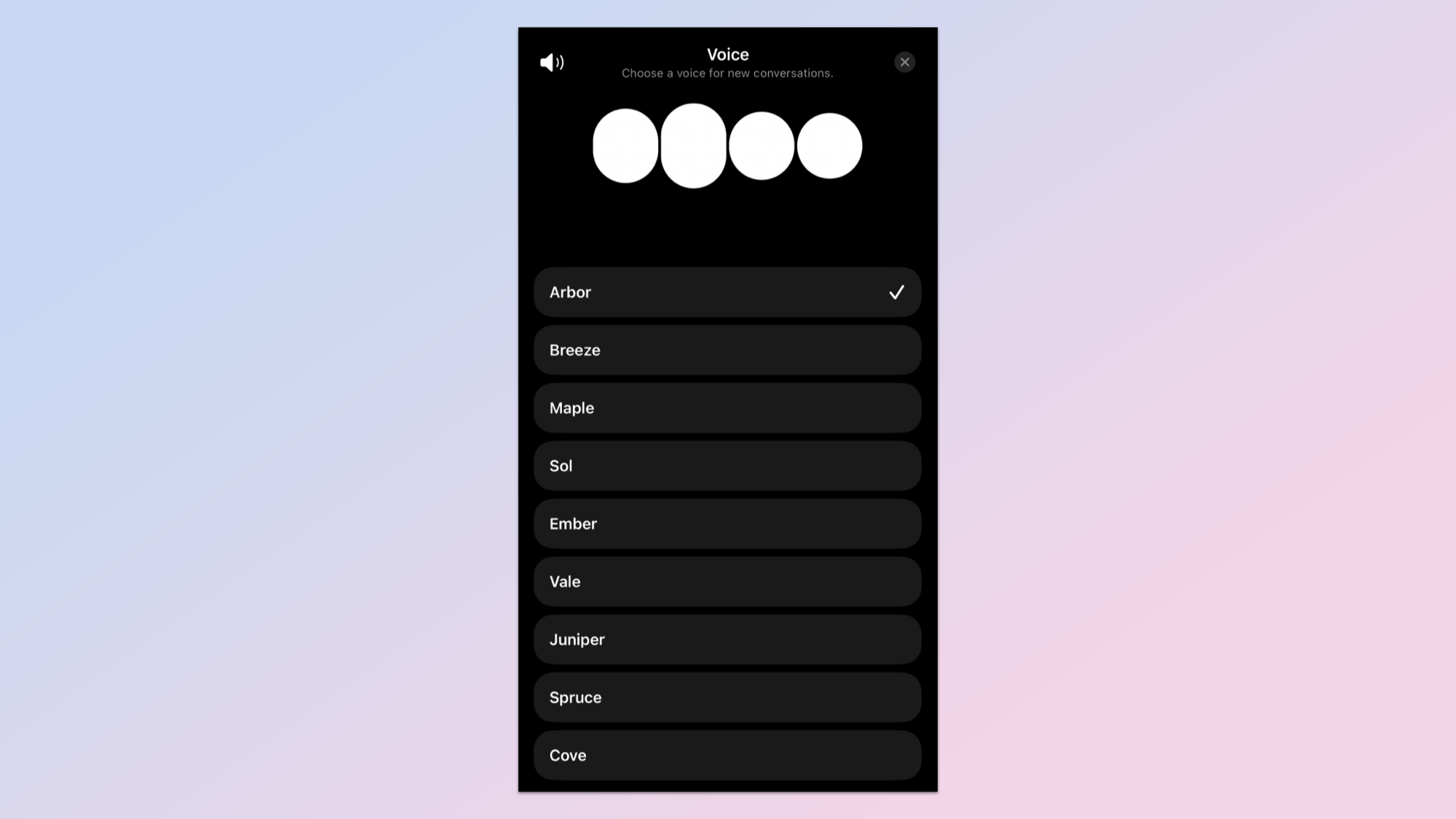I just tried ChatGPT’s 5 new voices — and it’s way better than any other voice AI
This is wild

Here at Tom’s Guide our expert editors are committed to bringing you the best news, reviews and guides to help you stay informed and ahead of the curve!
You are now subscribed
Your newsletter sign-up was successful
Want to add more newsletters?

Daily (Mon-Sun)
Tom's Guide Daily
Sign up to get the latest updates on all of your favorite content! From cutting-edge tech news and the hottest streaming buzz to unbeatable deals on the best products and in-depth reviews, we’ve got you covered.

Weekly on Thursday
Tom's AI Guide
Be AI savvy with your weekly newsletter summing up all the biggest AI news you need to know. Plus, analysis from our AI editor and tips on how to use the latest AI tools!

Weekly on Friday
Tom's iGuide
Unlock the vast world of Apple news straight to your inbox. With coverage on everything from exciting product launches to essential software updates, this is your go-to source for the latest updates on all the best Apple content.

Weekly on Monday
Tom's Streaming Guide
Our weekly newsletter is expertly crafted to immerse you in the world of streaming. Stay updated on the latest releases and our top recommendations across your favorite streaming platforms.
Join the club
Get full access to premium articles, exclusive features and a growing list of member rewards.
Meta has launched Meta AI Voice and went one step further than OpenAI in offering celebrity voices. However, while the familiarity of hearing Judi Dench might be fun, it isn't as appealing or engaging as the natural and realistic voices recently added to ChatGPT.
There are now nine Voice options in the ChatGPT app, working across basic and advanced voice. Each one has a different tone, style and — without over-anthropomorphizing it — personality.
OpenAI has cracked creating hyperrealistic-sounding voices. They even have human-like inflections and breathing sounds built into the pauses and this removes some of the artificial barriers found when trying other voice services like Gemini Live or Meta’s new AI voice. But, this does add a slight hint of Uncanny Valley where it sometimes feels "too real."
What it has, that Meta AI and Gemini Live don’t is speech-to-speech capabilities. This means that it can pick up on tone changes, intonations and even your accent and speed of speaking, allowing for a more natural, human-like conversation and faster interrupting.
What are the new ChatGPT Voices like?

Breeze, Cove, Ember and Juniper were the existing voices when Voice first launched and are still present. We haven’t seen the return of Sky after the Scarlett Johansen comparisons earlier this year but there are another five voices, including two with an English accent.
Arbor has an English accent and is designed to be easygoing and versatile, Maple is cheerful and candid, Sol is savvy and relaxed, Spruce is calm and affirming and Vale, also English, is bright and inquisitive.
I’m personally fond of Arbor as it sounds the most like me. It is like talking to a friend I grew up with rather than someone with an American accent. Its tone is also more natural sounding than the previous generation of voices. The only company close to OpenAI’s voice tech is ElevenLabs.
Get instant access to breaking news, the hottest reviews, great deals and helpful tips.
One of the coolest features of Advanced Voice is its adaptability. If you want it to sound more like yourself then you can ask it to adopt a specific accent. It won’t be able to directly mimic your voice due to guardrails, but it can sound like it's from “round your way."
If you want it to continue sounding like you all the time, just ask it to adopt an accent, set a speaking speed, and save that to its memory. Every time you re-open ChatGPT it will continue in that voice.
What can you do with Advanced Voice?
Being natively speech-to-speech gives Advanced Voice an Edge over other tools of this kind. As it's listening to the audio directly it can hear other sounds including background noises, music and the ums, ars and other sounds that you might make the aren't part of direct speech.
Unfortunately, OpenAI has chosen to disable many of these capabilities but the fact they exist still play into the effectiveness of the app. “Whether you are speaking quickly, slowly or with a lot of feeling, I’ll do my best to respond appropriately,” Arbor explained as we talked through its capabilities.
You can convince it to do things it isn’t ‘technically’ allowed to do such as sing or rap if you manage to talk it into it. For example, ask it to write some lyrics for a rap and have it read them. When done, ask it to do it much faster and it will slip into performing it as a rap rather than a poem.
I hope, over time, OpenAI relaxes the guardrails (within reason) and allows it to do more. For example, it should theoretically be possible to use it to improve your singing, teach you to beat box and even tune a guitar.
More from Tom's Guide
- 11 million Android users infected with dangerous Necro trojan — how to stay safe
- The best AI image generators tested
- Apple Intelligence — all of the AI features coming to the iPhone

Ryan Morrison, a stalwart in the realm of tech journalism, possesses a sterling track record that spans over two decades, though he'd much rather let his insightful articles on AI and technology speak for him than engage in this self-aggrandising exercise. As the former AI Editor for Tom's Guide, Ryan wields his vast industry experience with a mix of scepticism and enthusiasm, unpacking the complexities of AI in a way that could almost make you forget about the impending robot takeover.
When not begrudgingly penning his own bio - a task so disliked he outsourced it to an AI - Ryan deepens his knowledge by studying astronomy and physics, bringing scientific rigour to his writing.
 Club Benefits
Club Benefits





















